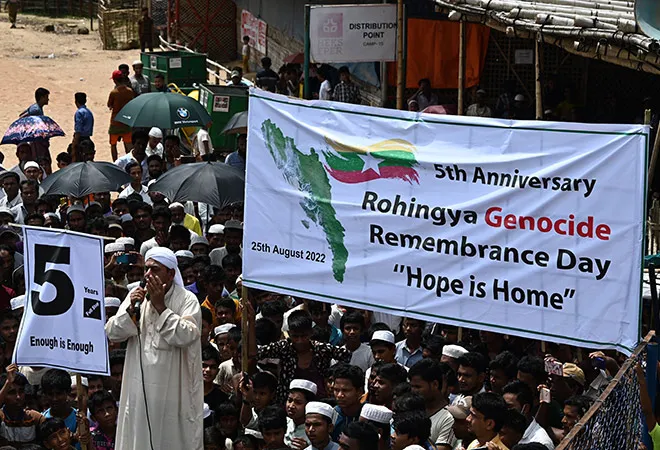
For a long time, south and southeast Asia have seen the consequences of radicalisation. The ongoing conflicts in Myanmar's northern Rakhine state, known as 'the Rohingya crisis,' have raised several concerns from regional security, humanitarian crisis to the nature of the conflict involving Rohingya Muslims.
Recently, the conflicts resurfaced in northern Rakhine state when the Burmese military launched counterinsurgency operations in October, in the wake of militant attacks on three border outposts that killed nine policemen along Myanmar-Bangladesh border. The past weeks have witnessed thousands of Rohingyas fleeing the country to escape increasing violence while several hundred thousand were displaced at home.
According to the UN, over 10,000 people have fled across to Bangladesh. Those who managed to escape have reported horrifying stories, including arson, killing, rape and building down of villages. The government of Myanmar refused aid agencies and journalists entry to the conflict areas and has denied the allegations.
The estimated 1.3 million Rohingya Muslims minority in the Buddhist majority country are mostly concentrated in the northern part of the country's coastal state of Rakhine that borders Bangladesh. The Myanmar government considers them 'illegal immigrants' from Bangladesh and are deprived of citizenship rights.
In 2012, when violence erupted between ethnic Rakhine Buddhists and the ethnic Rohingya Muslims, it was widely viewed as a communal conflict between two ethno-religious groups. The renewed violence against the Rohingyas is challenging the discourse. Some activists argue that the issue is nothing but a 'state-sponsored ethnic persecution.' This claim was bolstered when a UN official based in Bangladesh called the recent conflicts in northern Rakhine state nothing less than 'ethnic cleansing.'
The Office of the UN High Commissioner for Human Rights has said the Rohingya may be victims of 'crimes against humanity.' Former UN Secretary General Kofi Annan, who heads a commission to find solutions to the violence in Rakhine, expressed 'deep concerns' over reports of military abuses but refused to use 'genocide' to describe the Rohingya crisis. The debate over this issue will intensify if Myanmar soldiers continue its repression on Rohingyas.
Restricting media and aid agencies access to the conflict areas will only allow allegations of 'ethnic persecution' to persist. Targeting an entire community for actions of certain extremist elements will only help promote radicalisation to grow. Such actions will also strengthen the view that Myanmar is undertaking 'ethnic persecution.' Rather, the Myanmar government should work with the Rohingya community and regional governments in its effort to crack down those who are trying to destabilise the country and the wider region.
As Myanmar tries to calm down the situation, there are multiple implications as a result of the continuing violence against the Rohingyas. The most immediate implication is the humanitarian crisis that has been unfolding since the military operations began. The limited humanitarian access to the conflict areas has left many unable to access food and medical care.
Many Rohingyas fleeing to Bangladesh are being turned away by the Bangladesh coast guards. There are concerns that many may be compelled to drift out to the Bay of Bengal having no other option. Last year, the 'boat people' story sent shock waves around the world when thousands of people fleeing persecution in Myanmar were left to die in open sea as regional countries pushed the boats carrying them back in the waters of the Bay of Bengal.
Another growing concern in the region is that if persecution of Rohingyas continues in Myanmar, it is likely that many may be pushed to radicalisation and open the door for Islamist extremists to get a foothold in Myanmar. To be sure, there are already reports of linkages of Rohingya groups with extremists in the region. In a statement after the border outposts attack, Myanmar President Htin Kyaw blamed a little-known Rohingya militant group "Aqa Mul Mujahideen" (AMM) for the act.
According to media reports, the leader of the AMM is supposedly trained in Pakistan and the group had its origin from the Harkat-ul-Jihad Islami-Arakan (HUJI-A) which enjoys close relations with the Pakistan Taliban. Reports further claim Abdus Qadoos Burmi, the chief of HUJI-A, is a Pakistani national of Rohingya origin, who recruited Hafiz Tohar from a village in northern Rakhine state and arranged for his training in Pakistan. He now heads the AMM. Qadoos Burmi developed the HUJI-A network in Bangladesh in the remote hills of Bangladesh-Myanmar border through his close links with Lashkar-e-Tayyaba/Jamaatud Dawa (LeT/JuD), headed by Hafiz Sayeed, according to media reports.
In Muslim-majority neighbours such as Malaysia, Indonesia and Bangladesh, there are growing protests against what they call 'persecution of Rohingya Muslims' in Myanmar. Malaysian Prime Minister Najib Razak participated in a protests rally on 4 December to support the Rohingyas and called for review of Myanmar's membership in the regional bloc ASEAN over the Rohingya issue. In the world’s largest Muslim-majority country, Indonesia, several Islamic organisations have protested the killings of Rohingyas in Myanmar. On 25 November, thousands staged a protest rally in front of the Myanmar embassy in Jakarta to protest the prosecution of the Rohingyas. On the same day, in Bangladesh, thousands marched in the capital, Dhaka, to protest the persecution of Rohingyas in Myanmar.
At a time when Myanmar is looking for greater engagement after years of isolation, the ongoing violence in Rakhine state is negatively impacting its relations with several of its immediate neighbours. Increasingly, the Rohingya issue is becoming a bilateral issue. Myanmar has accused Malaysia of interfering in its internal affairs. Malaysia however argues that the Rohingya issue is no longer an internal affair of Myanmar as many Rohingya refugees live in several neighbouring countries and that human rights violation is a regional issue.
After decades of military rule, the southeast Asian nation had a free and fair election in 2015 that brought democracy icon and Nobel Peace laureate Daw Aung San Suu Kyi's party to power. With activists and regional leaders questioning her for not speaking up for the Rohingyas, Suu Ky is putting her own credibility at stake.
Read also: Is Myanmar’s political transition a model?
The views expressed above belong to the author(s). ORF research and analyses now available on Telegram! Click here to access our curated content — blogs, longforms and interviews.




 PREV
PREV


